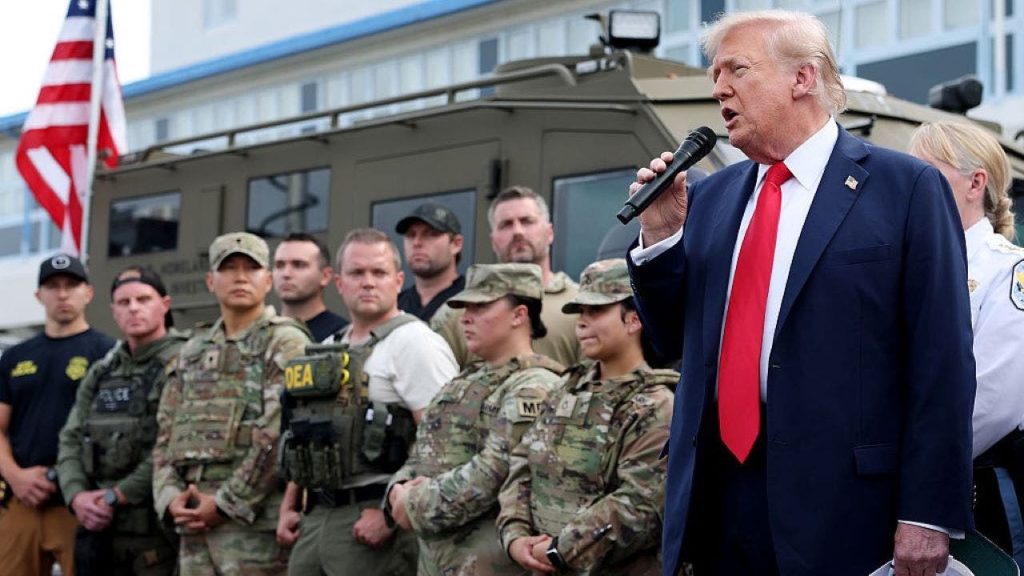Federal Judge Blocks Trump’s National Guard Deployment to Portland
In a significant legal rebuke to the Trump administration, U.S. District Judge Karin Immergut issued an emergency temporary restraining order late Sunday night blocking President Trump’s efforts to deploy National Guard troops to Portland, Oregon. The judge’s ruling not only halted the planned deployment of California’s National Guard but also prohibited using troops from any other state or Washington, D.C. in Oregon. This judicial intervention represents another chapter in the ongoing tension between federal authority and state sovereignty, with Judge Immergut explicitly stating that the administration’s actions appeared to violate both federal statute 10 U.S.C. §12406 and the Tenth Amendment of the Constitution. The ruling came amid heightened concerns about federal overreach and the proper role of military forces in domestic affairs.
During the proceedings, Judge Immergut pressed the Justice Department attorney, Eric Hamilton, on why the DOJ continued to pursue troop movements that seemed to directly contradict her previous restraining order. “How could bringing in federalized National Guard from California not be in direct contravention of the TRO that I issued yesterday?” she asked pointedly, adding, “You’re an officer of the court. Aren’t defendants circumventing my order?” While Hamilton attempted to defend the administration’s position, the judge firmly pushed back, stating, “You have to have a colorable claim that Oregon conditions warrant deploying the National Guard — you don’t.” This exchange highlighted the court’s frustration with what appeared to be attempts to work around judicial authority, with Oregon’s legal representative Scott Kennedy describing the situation as “a game of rhetorical Whac-A-Mole” and noting concerns that similar deployments might be planned for other cities, including Chicago.
The urgency of the situation was emphasized when Judge Immergut denied both the Justice Department’s request for a stay and an administrative delay. “I’m handling this on an emergency basis with limited briefing,” she explained, adding that “No new information has been provided about any new issues in Portland.” This suggests the court found no legitimate justification for the administration’s continued pursuit of the deployment, despite claims about addressing “domestic unrest.” The ruling represents a significant check on executive power, particularly regarding the use of military forces in domestic contexts, and reinforces the judiciary’s role in maintaining constitutional boundaries even in situations the administration characterizes as emergencies.
California Governor Gavin Newsom quickly celebrated the victory on social media, writing: “BREAKING: We just won in court — again. A federal judge BLOCKED Donald Trump’s unlawful attempt to DEPLOY 300 OF OUR NATIONAL GUARD TROOPS TO PORTLAND.” He emphasized that the court had granted their request for a Temporary Restraining Order, “HALTING ANY FEDERALIZATION, RELOCATION, OR DEPLOYMENT of ANY GUARD MEMBERS TO OREGON FROM ANY STATE.” Newsom’s statement concluded with a forceful assertion that “Trump’s abuse of power won’t stand,” reflecting the political dimensions of this legal battle and the significant state resistance to federal intervention in what many governors view as state matters.
The legal question at the heart of this case revolves around the proper interpretation of federal authority to deploy National Guard troops versus states’ rights to control their own military forces. The Trump administration has indicated it will appeal the ruling, likely arguing that the president retains authority under federal law to deploy National Guard forces in cases of “domestic unrest.” This pending appeal promises to further test the constitutional boundaries between federal and state power, particularly in the context of public safety and law enforcement. The dispute raises fundamental questions about federalism and the appropriate limits on presidential authority during domestic disturbances.
This case exists against the backdrop of broader tensions about federal responses to protests in American cities and disagreements about the appropriate role of military forces in civilian contexts. Judge Immergut’s ruling represents a significant judicial check on executive authority and reinforces the principle that presidential powers, even during periods of unrest, remain subject to constitutional and statutory constraints. As this legal battle continues through possible appeals, it will likely serve as an important precedent in defining the boundaries of federal authority in deploying military forces domestically and the ability of states to resist such deployments when they believe federal actions exceed constitutional limits. The outcome will have implications not just for Portland but for federal-state relations across the country.


